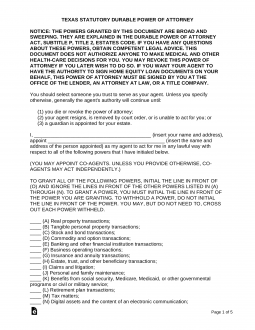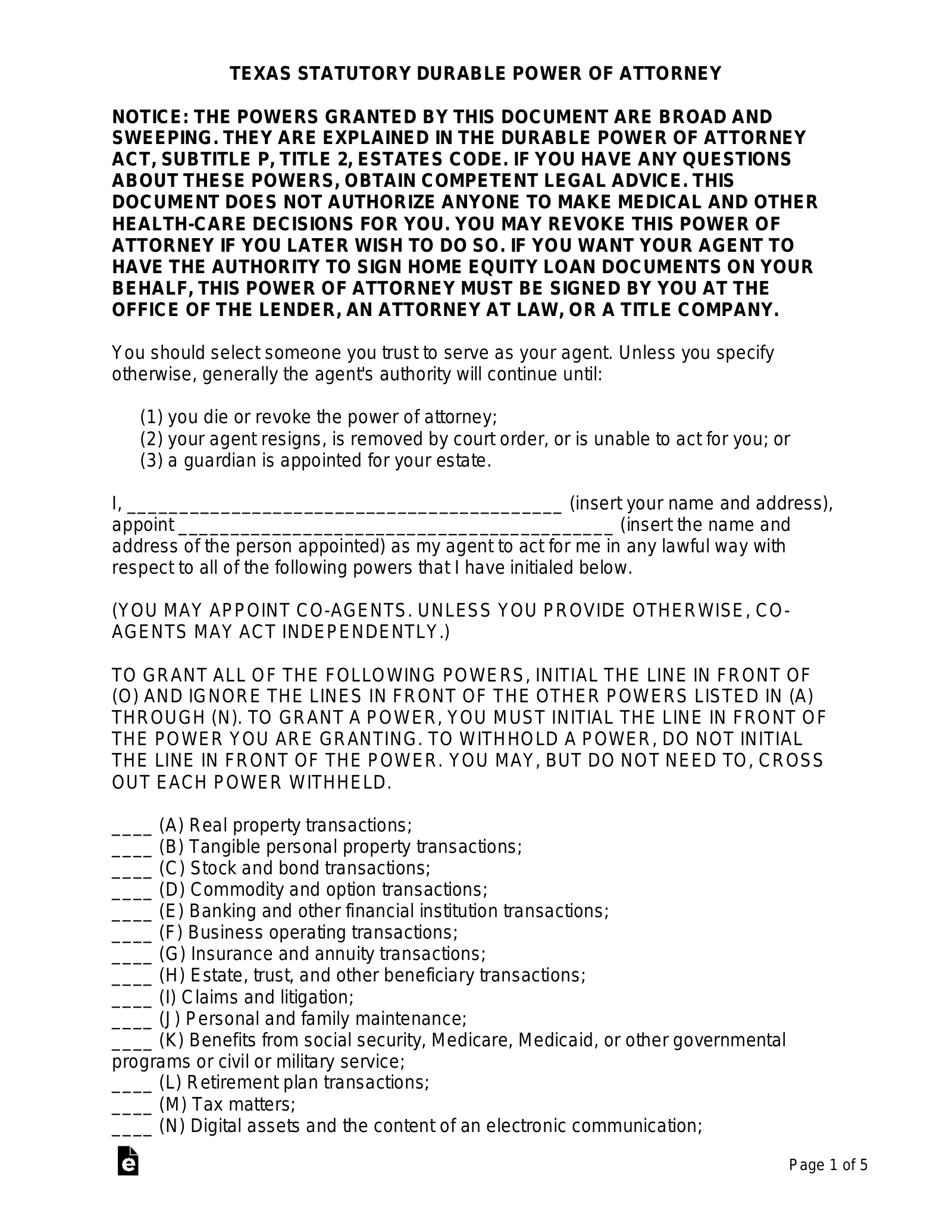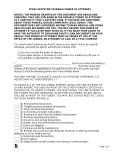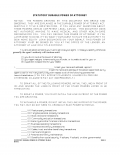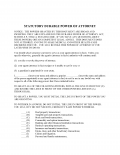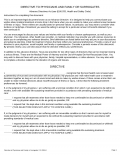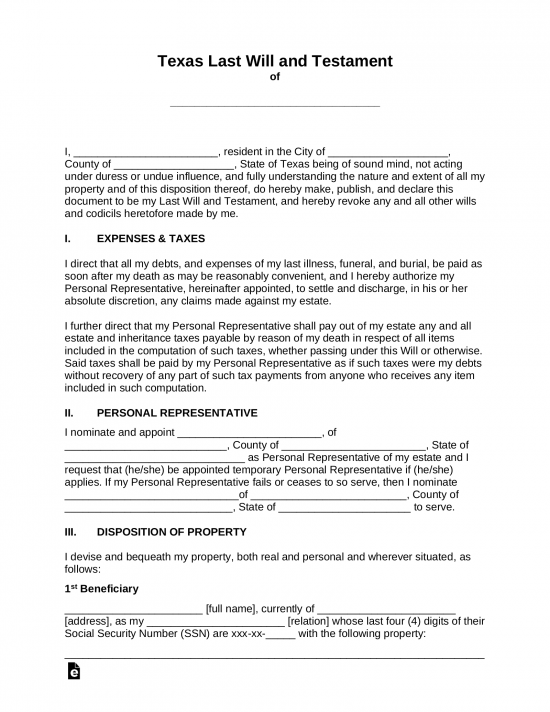Updated October 10, 2023
A Texas durable statutory power of attorney form can be used to designate someone else (“agent”) to represent a person’s financial interests on their behalf. The decisions agent makes would be binding as if the principal had made the decisions themselves. Under a “durable” form, the designation lasts until the death of the principal unless revoked. Therefore, it’s imperative that the agent selected is a trusted individual such as a spouse, family member, or close friend.
Versions (3)
Download: PDF, MS Word, OpenDocument
Download: PDF
Download: PDF
Table of Contents |
Laws
TX Est Code, Title 2, Subtitle P (Durable Powers of Attorney)
Definition of “Durable Power of Attorney”
“Durable power of attorney” means a writing or other record that complies with the requirements of Section 751.0021(a) or is described by Section 751.0021(b) (TX Est Code § 751.002(4)).
Signing Requirements
The principal is required to have their signature acknowledged before a notary public (§ 751.0021).
Statutory Form
Texas’ statutory durable power of attorney form can be found within TX Est Code § 752.051.
How to Write
Download: PDF, Microsoft Word (.docx) or OpenDocument (.odt)
1 – Download This Paperwork To Appoint An Agent With Power Of Attorney
This page enables you to download the required template either through the links above or the buttons presented with the preview image. Notice that each of these labels is a file type (“PDF,” “Word,” and “ODT”). You should select one of these file types, review its contents, then save it to an accessible folder on your machine.
2 – Complete The Declaration Statement
The first area in this document will deliver some important information related to appointing a power of attorney. Make sure to review this section. If anything remains unclear, then it would be advisable to consult a qualified professional (i.e. an attorney). 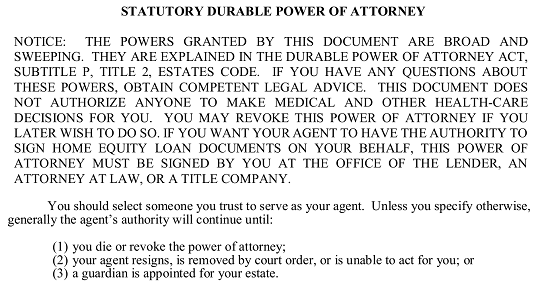 Once you have read this introduction, locate the first blank line on this page. You must present your full name and address on this line.
Once you have read this introduction, locate the first blank line on this page. You must present your full name and address on this line.  Since this statement will declare your intention to delegate your authority for your Agent’s use, you will need to identify the Agent. Fill in his or her full name and address on the second blank space of this paragraph. If you wish to appoint more than one Agent through this document, you may do so. Make sure to include the name and address of every Co-Agent to this area as well. You may do this by either extending the blank space with the appropriate software or you may cite a clearly labeled attachment that is coupled with this document by the time it is signed.
Since this statement will declare your intention to delegate your authority for your Agent’s use, you will need to identify the Agent. Fill in his or her full name and address on the second blank space of this paragraph. If you wish to appoint more than one Agent through this document, you may do so. Make sure to include the name and address of every Co-Agent to this area as well. You may do this by either extending the blank space with the appropriate software or you may cite a clearly labeled attachment that is coupled with this document by the time it is signed. 
3 – Define How The Principal Power Should Be Used
There will be a few sections dedicated to enabling you to fully describe in what areas of your life, you expect the Agent to represent your interests with principal power. The first of these sections will present a list of general subjects. Each of these items (A through O) will be preceded by a corresponding blank space. If you wish to approve the Agent to represent you in the area defined by one of these items, then you must initial the blank space that precedes it. Depending upon your needs, there are one of two ways you can approve of these powers. If you wish to grant the Agent the authority to represent you in some of these subject matters, but not all, then go through this list and initial each item the Agent should be granted authority in. For instance if you wish to approve the Agent to have the authority to represent you for “Real Property Transactions,” “Tangible Property Transactions,” “Business Operating Transactions,” “Claims And Litigations,” and in your “Tax Matters” then initial the blank spaces that correspond with items “(A),” “(B),” “(F),” “(I),” and “(M).” See the example below. 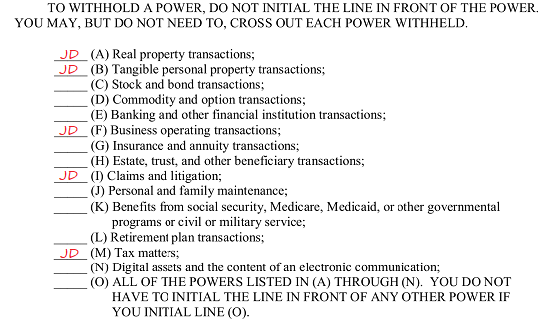 If you intend to grant principal power to the Agent in all these areas then, you may provide your approval in one fell swoop by initialing the blank space that precedes “(O) All Of The Powers…” It should be noted, that if you initial this statement, you may not initial statements “(A)” through “(N).”
If you intend to grant principal power to the Agent in all these areas then, you may provide your approval in one fell swoop by initialing the blank space that precedes “(O) All Of The Powers…” It should be noted, that if you initial this statement, you may not initial statements “(A)” through “(N).” 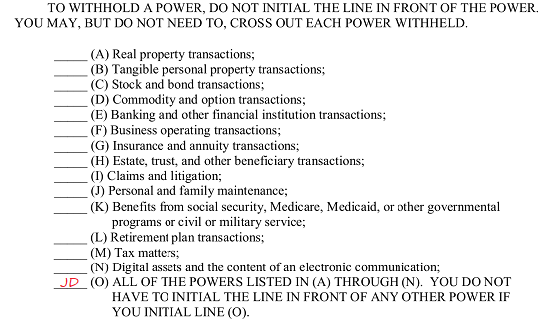 The “Special Instructions” section will address additional definitions including one for the reimbursement and compensation of your Agent. Naturally, there may be costs when an Agent is actively representing you (i.e. plane tickets, meals, putting money up front to hire an entity in your name, etc.) and sometimes Agents require compensation for their services. This area will include a list of statements defining the relationship between the Agent, his or her expenses and compensation, and you (the Principal). You must initial the statement that best describes your stance on reimbursement and what will occur when the Agent must pay for the expenses of representing you up front. Keep in mind, that if you do not choose any of these statements then, by default, “Each Agent Will Be Entitled To Compensation” provided it is reasonable enough.
The “Special Instructions” section will address additional definitions including one for the reimbursement and compensation of your Agent. Naturally, there may be costs when an Agent is actively representing you (i.e. plane tickets, meals, putting money up front to hire an entity in your name, etc.) and sometimes Agents require compensation for their services. This area will include a list of statements defining the relationship between the Agent, his or her expenses and compensation, and you (the Principal). You must initial the statement that best describes your stance on reimbursement and what will occur when the Agent must pay for the expenses of representing you up front. Keep in mind, that if you do not choose any of these statements then, by default, “Each Agent Will Be Entitled To Compensation” provided it is reasonable enough. 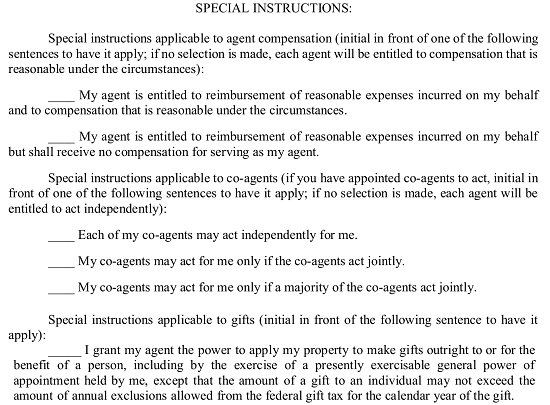 If you plan on reimbursing the Agent for expenses that were incurred when representing you (so long as they are reasonable and accountable) and will be compensated accordingly then, initial the first statement.
If you plan on reimbursing the Agent for expenses that were incurred when representing you (so long as they are reasonable and accountable) and will be compensated accordingly then, initial the first statement.  If the Agent will be reimbursed for expenses, he or she had to cover to represent you but will not be compensated for acting as your Agent, then initial the second statement.
If the Agent will be reimbursed for expenses, he or she had to cover to represent you but will not be compensated for acting as your Agent, then initial the second statement.  If you have named two or more Agents to represent you with principal authority then, you will need to indicate how you expect them to act. Only one of the statements in the next area may be initialed. Bear in mind, that if none are initialed then the first statement (by default) will be the statement that best describes their relationship according to this document.
If you have named two or more Agents to represent you with principal authority then, you will need to indicate how you expect them to act. Only one of the statements in the next area may be initialed. Bear in mind, that if none are initialed then the first statement (by default) will be the statement that best describes their relationship according to this document.  If you wish them to act independently of one another so that one does not need to consult with or gain approval from the other when representing, you then initial the statement beginning with “Each Of My Co-Agents…”
If you wish them to act independently of one another so that one does not need to consult with or gain approval from the other when representing, you then initial the statement beginning with “Each Of My Co-Agents…” 
If the Co-Agents may wield principal power only if they all act unanimously (together) then initial the second statement in this area.  If you prefer that only the majority of Co-Agents are required to agree for one of them to take action wielding principal authority, then initial the third statement in this area.
If you prefer that only the majority of Co-Agents are required to agree for one of them to take action wielding principal authority, then initial the third statement in this area.  The definition the “Special Instructions” will seek is your position on the Agent’s use of your property and assets to make gifts in your name. bear in mind this can be used to forgive debts. If you wish your Agent to make such decisions and take actions based on those decisions, then initial the statement beginning with the words “I Grant My Agent The Power To Apply My Property…”
The definition the “Special Instructions” will seek is your position on the Agent’s use of your property and assets to make gifts in your name. bear in mind this can be used to forgive debts. If you wish your Agent to make such decisions and take actions based on those decisions, then initial the statement beginning with the words “I Grant My Agent The Power To Apply My Property…”  The blank lines presented beneath the above statements will give you an opportunity to directly record instructions, limitation, provisions, or specifications that you may have regarding the powers being granted to the Agent. This area is optional and only requires such directives if you believe they are necessary. If you have no such directives then, you may simply write the word “None” (as a precautionary measure).
The blank lines presented beneath the above statements will give you an opportunity to directly record instructions, limitation, provisions, or specifications that you may have regarding the powers being granted to the Agent. This area is optional and only requires such directives if you believe they are necessary. If you have no such directives then, you may simply write the word “None” (as a precautionary measure). 
4 – Detail How These Powers Will Start
The section following the blank lines on this page will supply two statements, “(A)” and “(B).” You must decide which statement should not apply to how the powers granted here relate to your potential incapacitation, then cross that statement out. You may supersede this section using the blank lines in the area above to document how these powers begin, terminate, and how your incapacity affects them.
Cross out statement “(A)” if you require that the powers granted here do not become available to the Agent when you have signed this document but go into effect only upon a physician delivering a written diagnosis that you are incapacitated or that your ability to reason and communicate have been severely compromised.  Cross out statement “(B)” if the powers being granted here must be available to the Agent as soon as you sign this document and remain in effect regardless of the status of your physical or mental health.
Cross out statement “(B)” if the powers being granted here must be available to the Agent as soon as you sign this document and remain in effect regardless of the status of your physical or mental health.  The last paragraph of this document will provide an opportunity to name Successor Agents. The language here will designate an individual to step up and automatically assume all the principal powers granted to an absent or ineligible Agent. Once this occurs the Successor Agent will be able to represent you with the same rights and ability you named to the original Agent being replaced. It should be mentioned that a Successor Agent does not have access to principal authority until the original Agent(s) can no longer be considered active. You may name more than one Successor Agent in the order you wish them to assume principal power.
The last paragraph of this document will provide an opportunity to name Successor Agents. The language here will designate an individual to step up and automatically assume all the principal powers granted to an absent or ineligible Agent. Once this occurs the Successor Agent will be able to represent you with the same rights and ability you named to the original Agent being replaced. It should be mentioned that a Successor Agent does not have access to principal authority until the original Agent(s) can no longer be considered active. You may name more than one Successor Agent in the order you wish them to assume principal power. 
5 – Execute This Appointment By Signing It
You have finished defining the Agents and Co-Agents you are granting principal authority, the types of principal powers being granted, and any additional instructions that serve to deliver a full representation of how and when your Agent(s) must represent you. When you are ready, you will need to sign this document to make it effective. Begin, by locating the words “Signed This…” then enter the calendar day, month, and year that you are signing this document across the three blank spaces that follow. ![]() Sign your name on the blank space labeled “Your Signature” in the presence of a Notary Public and immediately after reporting the calendar date above. Once done, relinquish this paperwork to the Notary Public.
Sign your name on the blank space labeled “Your Signature” in the presence of a Notary Public and immediately after reporting the calendar date above. Once done, relinquish this paperwork to the Notary Public.  The Notary Public will then supply the next area with the location where you signed this document, the calendar date when you signed this document, your name, his or her credentials, and any seal required for the notarization process.
The Notary Public will then supply the next area with the location where you signed this document, the calendar date when you signed this document, your name, his or her credentials, and any seal required for the notarization process. 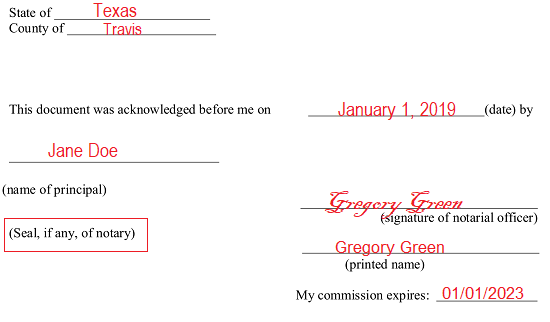
6 – Additional Information Has Been Included For The Agent
The Agent should receive a copy of this full appointment. An additional document “Information For The Agent” has been included as a guide for the Agent to use regarding how every Agent who represents a Principal should act. 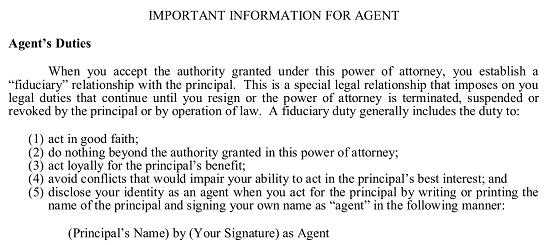
Related Forms
Download: PDF

